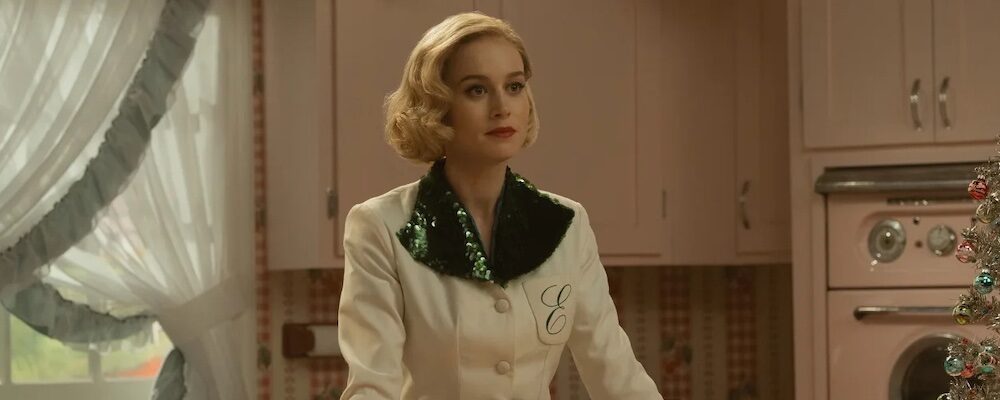‘Lessons in Chemistry’ Takes on Misogyny With 1950s Style and a Memorable Brie Larson
Alci Rengifo
Apple TV is becoming the streamer where good actors go aware their performances will be the key highlight of any given program. “Lessons in Chemistry” is the studio’s latest adaptation of a bestseller boasting slick cinematography, production design and music. But the real focus will be on Brie Larson’s acting, which shows growth for the actor in sustaining a measured, purposefully wooden performance. Creator Lee Eisenberg adapts the novel by Bonnie Garmus into what should be called Peak TV paperbacks. You’re not meant to be gripped as with classic television. This means the pacing and introduction of plot and character move along with the rhythm of reading the chapters of a book. Like many of the novels getting scooped up for screen transformations, it’s also a socially conscious fable that at its best captures the suffocating air of misogyny.
The setting is the 1950s at the fictional Hastings chemical institute in Los Angeles. Larson plays Elizabeth Zott, a lab tech who gets into trouble for using lab equipment after hours to conduct her own research. It’s a man’s world and the institute’s bosses don’t approve of a woman trying to go beyond her station. A star scientist at the place is Calvin (Lewis Pullman). He also happens to be the one whose lab supplies get snatched by Elizabeth. Both start getting close through a friendship that clearly begins to hint at romance. But Calvin is also oblivious to Elizabeth’s trials as a woman. She’s looked down upon for not having a PhD, which she didn’t finish after being sexually assaulted by a superior. Yet, they share the same interest in abiogenesis, meaning the theory that life originated from nonliving matter. Elizabeth may have feelings for the scientist, but she’s also independent and committed to her ideas which will eventually land her on a cooking show.
That last bit of information may seem confounding to readers new to the story, but it is part of the show’s charming sense of rebellion. If Elizabeth can’t find a place at the lab, especially because, as today, she’s denied opportunities over not having the right degree, TV will give her a platform. The result is a hybrid show where she doesn’t just do recipes, but explains why certain ingredients do what they do. This story development is hinted at in the show’s fast forwards at the end of episodes. Narratively it gives away the game. But most of the series works as a lighter companion to shows like “Mad Men.” We get those moments startling to us in a post-#MeToo reality where Elizabeth endures openly sexist comments or other scientists calling her “Darling.” Men like Calvin can wash nearly naked in the lab and not get called out for it. Though sometimes the commentary gets piled on without feeling like the organic outgrowth of a bygone society, as in “Mad Men” where the characters feel unaware we are watching them from the future.
Eisenberg and team are so eager to stay faithful to the novel that they also misstep at times in trying to literally transfer over the text. An episode completely narrated by Elizabeth’s dog just feels odd. A side story involving a Black American neighbor of Elizabeth’s, Harriet (Aja Naomi King), fighting to stop the racist gentrification of her neighborhood feels both relevant but tacked on. It has few consequences to the rest of the story aside from Calvin looking like a jerk for missing a town hall meeting he promises Harriet he’ll attend. Brie Larson manages to give everything cohesiveness by giving her character a firm heroism. She may be understandably intimated by the misogynist environment, but when necessary she puts fear aside to stand up for what she wants. She makes cornball scenes work, as when Calvin and Elizabeth apply for a grant and decide to do it without Hastings, since the institute won’t back it with her name attached. She also makes it clear to Calvin she doesn’t want marriage or children. The cooking show segments also have a unique eeriness. Elizabeth can explain why baking powder works, but will tensely make a statement not only about her unease, but the general feeling women had of being confined into a conservative era.
If you’ve read the novel you know where the rest of the story is going. Elizabeth will endure many trials and tribulations along the way involving broken love, trauma and chasing after her dreams. She will fall into motherhood, giving her baby scientific instruction to breastfeed. It is the kind of material Apple TV excels at. They do not specialize in cheerful television. Even “Ted Lasso” has its dark edges. Visually this is an elegant viewing experience with warm cinematography and production design that brings the ‘50s through ‘60s to life vividly. In a sense, that’s completely expected considering the studio’s track record. “Lessons in Chemistry” can feel designed specifically for those already familiar with the material, though much of it is worth viewing for how good it’s pulled off. For Brie Larson it proves she’s more than Ms. Marvel and the acting chops that won her an Oscar for “Room” are on full display. She gives the show life by evoking the hardships of proving yourself in a closed off world.
“Lessons in Chemistry” begins streaming Oct. 13 with new episodes premiering Fridays on Apple TV+.

